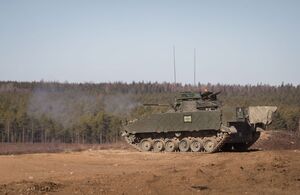1,500 UK troops join major NATO exercise amid expanded UK deployment to Estonia
More than 1,500 UK troops are set to train alongside thousands of personnel from NATO Alliance countries, as part of a major exercise in Estonia.

More than 140 platforms including Mastiff, Jackal and Coyote have deployed to Estonia under the Light Dragoon Battlegroup for Exercise Spring Storm.
- Personnel from all three services of the UK Armed Forces are deployed in Estonia, carrying out exercises and operations as part of our commitment to NATO.
- More than 1,500 troops have been deployed for Exercise Spring Storm, demonstrating the reinforcement of the UK-led NATO enhanced Forward Presence (eFP) Battlegroup to Brigade-sized strength.
- 14,000 personnel from 11 NATO countries will demonstrate interoperability in multi-domain training scenarios as part of the exercise.
More than 1,500 UK troops are set to train alongside thousands of personnel from NATO Alliance countries, as part of a major Estonian-led exercise.
Exercise Spring Storm is the largest annual military exercise involving the UK-led NATO enhanced Forward Presence Battlegroup, comprised of both UK and French forces, with more than 14,000 personnel due to take part from 11 NATO countries.
At last year’s NATO summit, the UK committed to increase the size of its eFP commitment, with this year’s exercise marking the first time the UK has conducted a brigade-sized deployment to Estonia – involving hundreds more personnel than in previous deployments.
Spread across tough and varied Estonian terrain, ground units will be tested on realistic battlefield scenarios including trench assaults, reconnaissance missions, and light infantry tactics, moving up to armoured vehicle manoeuvres and combined arms warfare.
Defence Secretary, Ben Wallace, said:
Hundreds of UK troops from across our Armed Forces will again train with personnel from eleven NATO nations, demonstrating the strength of our interoperability with partner nations and our combined commitment to the NATO Alliance.
While the Russian Army continues their illegal invasion of Ukraine threatening stability in Europe, the UK and our allies will continue to support Ukraine and defend our shared values and freedom.
Beyond the land-based elements of the two-week exercise, members of the RAF will carry out training exercises in reconnaissance and air-land integration, while Royal Marines Commandos will also carry out a beach assault exercise to test the UK’s maritime strike capability.
The eFP provides a continuous NATO presence along its eastern border, with deployed troops acting as a deterrence against any aggression towards the Alliance’s borders. Recent actions carried out as part of the UK-led eFP include air intercepts of Russian aircraft by RAF fighter jets.
Personnel from the British Army’s 7th Light Mechanised Brigade Combat Team (7LMBCT) HQ and Light Dragoons Battlegroup (LD BG) join the Queen’s Royal Hussars (QRH) for the exercise, which will include Challenger 2 tanks, Warrior and CV90 Infantry Fighting Vehicles, Jackal, CAESAR self-propelled howitzers, and other artillery pieces, including British GMLRS and US HIMARS.
Supporting air-based exercises will be four Wildcat and five Apache helicopters, as well as three RAF Typhoon fighter jets.
The Queen’s Royal Hussars Commanding Officer Lt Col Steve Wilson said:
The eFP is looking forward to the opportunities provided by Exercise Spring Storm. The chance to train over the terrain we might need to defend adds to the gravitas of the exercise.
Our Battlegroup is fully integrated with 1st Estonian Brigade and brings a highly trained and capable UK and French troops to the field. We will be bringing a wide range of hard-hitting capabilities from Main Battle Tanks (MBT), anti-tank, and artillery to snipers, mortars, engineers and tactical air controllers. We look forward to demonstrating the capabilities and resolve of the NATO alliance over the coming days.
The exercise is conducted in a peer-on-peer format, allowing the reconnaissance capabilities of the LD Battlegroup to be tested against the heavy armour of the QRH Battlegroup, and vice versa.
Updates to this page
-
The words "Estonian-led" have been added to the first line.
-
First published.